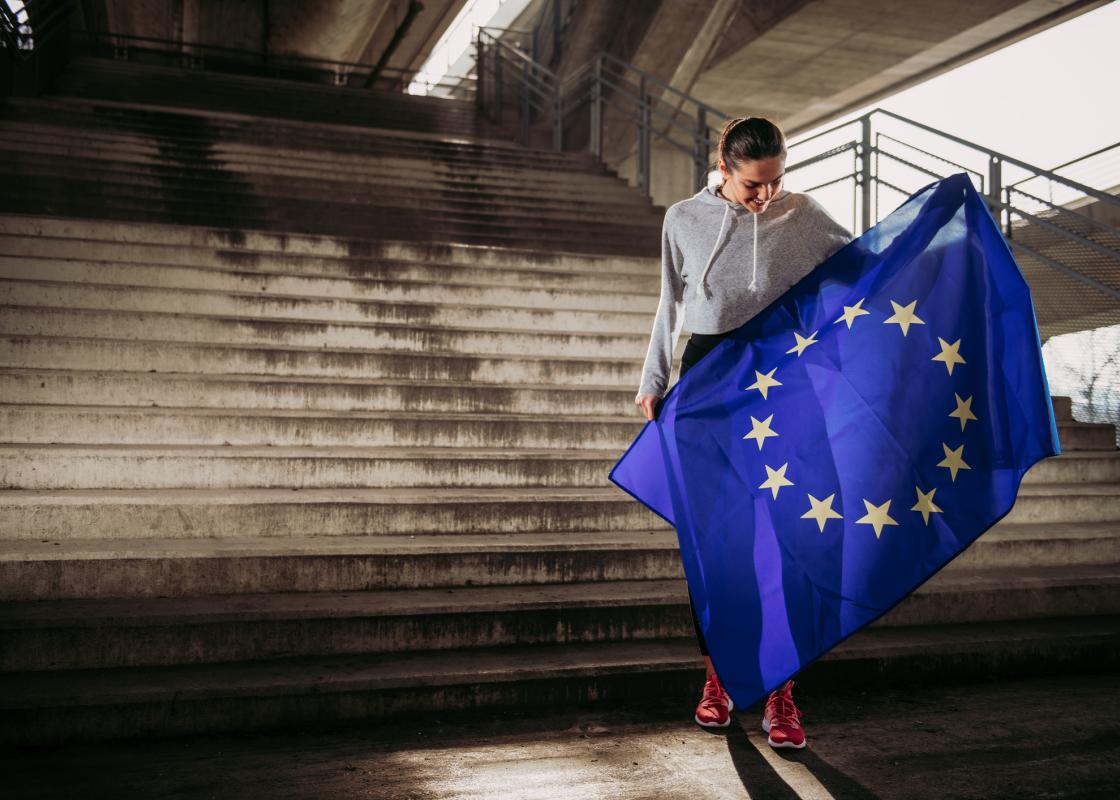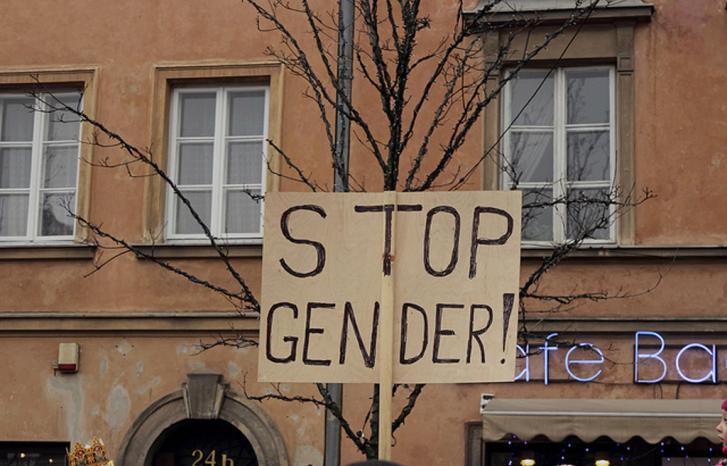Has the EU affected Nordic gender equality policies? And if so, for better or worse?
These are two of the main questions posed in the recently published book Europeisering av nordisk likestillingspolitikk (‘Europeanisation of Nordic gender equality policies’). The book is written by researchers Cathrine Holst, Hege Skjeie and Mari Teigen. Skjeie, a central scholar within the gender equality research field, passed away during the work with the book.
The EU’s contribution to increased protection against discrimination has doubtlessly enriched Nordic gender equality policies.
On 28 November 1994, nearly twenty-five years ago, Norwegians voted against Norwegian membership in the European Union. Women were in majority on the no-vote. The argument that the EU would undermine Norwegian welfare policies was decisive for many, both men and women.
“To many, it was important to maintain the Nordic gender equality model. This is characterised by a strong prioritisation of welfare schemes such as parental leave and publicly funded kindergartens,” says Cathrine Holst, professor of Sociology at University of Oslo.
Still strong family policy
The researchers behind the book now conclude that Nordic gender equality characteristics such as the family policy have not been affected by the EU to any significant extent.
“Since 1994, the Nordic countries have actively developed their family policy without obstructions from the EU,” says Holst.
“Our findings indicate that Norway has been equally affected, or unaffected, by the EU’s equality policies as countries such as Sweden and Denmark. Sweden and Denmark, moreover, who are both members of the EU, prioritise gender equality very differently.”

“Does this mean that Norwegians had nothing to worry about with regard to the EU’s influence on Norway’s gender equality policies?”
“The concern seems to have been exaggerated, but it was nevertheless understandable,” says Holst, and explains:
“Many were worried about a ‘race against the bottom’; that deregulation of the economy and weakened workers’ rights in other EU countries would put Norwegian gender equality policies under pressure. But we have found few traces of this.”
At the same time, it is obvious that family policies are not on top of the EU’s agenda, according to the researchers.
In 2015, the European Commission withdrew the proposal for a new parental leave directive that would strengthen women’s rights for paid parental leave throughout the EU area. The European Parliament was in favour of the directive, but a minority of member states were against and managed to block the proposal.
“This is an example of how gender equality initiatives in the EU are blocked by conservative governments and a powerful business lobby,” says Holst.
“The European austerity policies following the financial crisis have not made things any better. However, this has not yet affected Norway – the family policy is developed on the national level,” she continues.
Improved protection against discrimination
Although the researchers do not find any indications that the EU has undermined the Nordic gender equality model, this does not mean that the EU does not affect the gender equality policies. Both in Norway and in other European member countries, the EU has left some obvious traces, particularly in the judiciary field.
“The EU has been a driving force in the development of equality legislation and anti-discrimination policies, also in Norway,” says Holst.
Through the EEA Agreement and the comprehensive system of contracts between Norway and the EU, Norway has adjusted its legislation in line with EU regulations and court decisions. The EEA Agreement comprises many of the EU’s gender equality and anti-discrimination directives. Norway has also endorsed directives on its own initiative.
In Norway, positive discrimination and quota allocation have traditionally been considered significant measures in promoting gender equality.
“Norway passed legislation against gender-based discrimination as early as in 1978. The law was meant to cover all areas in society. As a result of the EU directives, the anti-discrimination legislation has been strengthened and extended to cover race and ethnicity, religion and life stance, functional ability, age and sexual orientation,” says Holst.
“In addition, there are a number of important legal verdicts from the European Court of Justice that have provided increased protection against discrimination of pregnant women for instance,” Holst explains.
The researchers argue that within the ‘social democratic gender order’, questions related to discrimination have not been as central as welfare schemes. With the EU, Norwegian equality policies have become more multidimensional and legally founded.
“We see this when it comes to equal pay, for instance. Here, regulations related to equal pay must be justified in accordance with EU standards,” says Holst.
“The EU’s contribution to increased protection against discrimination has doubtlessly enriched Nordic gender equality policies,” she continues.
Challenges the social democratic approach
But according to the researchers, the EU has also challenged the social democratic approach to gender equality in ways that are more problematic. For instance, the EU has set clear limits for Norwegian policies related to the use of gender quotas.
In 2003, the University of Oslo was convicted by the EFTA Court for earmarking postdoctoral positions for women, which was considered contrary to the EU’s regulations for equal treatment, and thus also contrary to the EEA regulations.
“In Norway, positive discrimination and quota allocation have traditionally been considered significant measures in promoting gender equality, including quota allocation in the political parties’ nomination processes and requirements for gender balance in corporate boards,” says Holst.
Positive discrimination is not illegal per se through the EEA, but arrangements cannot be discriminating, and this makes schemes such as earmarking of positions illegal.
“We have been required to think differently about gender quotas within the EEA in order to ensure that our measures are in line with the directives.”
There is, however, no consensus regarding whether such regulations are positive or negative.
“Some people argue that such verdicts are important, as Norwegian quotas should not have discriminating effects. Others argue that the EU legislation has put unreasonable boundaries on what measures we should be able to use in order to achieve equality,” says Holst.
False security slows preventive action
Vibeke Blaker Strand, professor of public law at the University of Oslo, argues that the traditional Norwegian gender equality model has been challenged in another way too.
“The EU's discrimination regulations are more about taking action against discrimination that has already taken place, and not so much about taking preventive action. Thus the regulations have an individualised approach to discrimination,” says Blaker Strand.

The EU legislation enhances the individual’s right to take legal action if you have been subjected to discrimination and to seek compensation and restitution.
“But ideally we should prevent it from happening in the first place. This is where the EU legislation falls short. It does of course have a preventive effect, but it is not enough.”
She worries that an individualised and EU conformable approach may result in a feeling of false security, and that the decision makers fail to see what may be done on a national level. If this is the case, this breaks with the Norwegian tradition, according to Blaker Strand.
“Preventive measures are oriented towards social structures and groups. In Norway, we have been in the forefront of this work, for instance with the introduction of the requirements for activities and reporting, which is meant to promote gender equality and prevent discrimination in the workplace.”
The UN’s women’s convention (CEDAW) has a broad approach to preventive measures, according to Blaker Strand. We also find such an approach in the Istanbul Convention, which is the Council of Europe’s convention for preventing and combating violence against women and domestic violence. Norway endorsed the convention in 2017.
We need both preventive and legal measures, she maintains.
“With the new anti-discrimination legislation, which was passed in 2017, Norwegian authorities proposed to remove the requirement for reporting. But we should not move too far in that direction. We need both kinds of measures to fight discrimination.”
Blaker Strand supports Holst and the other researchers in their claim that the EU has strengthened Norwegian protection against discrimination.
“Besides, the EU has had regulations from very early on against harassment and sexual harassment, before this became a hot topic with the #metoo campaign. The EU has also had strong protection towards discrimination of pregnant women.”
An ally for the women’s movement
Although the EU has challenged the social democratic approach to gender equality in some areas, Holst, Skjeie and Teigen conclude that in general, the EU is not as bad as it is made out to be. Not only has the EU strengthened the anti-discrimination protection in both member states and partner countries. The union has also been an important ally for the European women’s movement on several occasions.
“The European Women’s Lobby is an umbrella organisation for national women’s associations in Europe. It has institutional support from the EU to lobby for their central aims, and it has become an important voice within the European Commission and the European Parliament,” says Holst.
National women’s movements experience that it may be easier to gain support on the EU level than on a national level
National women’s movements experience that it may be easier to gain support on the EU level than on a national level, she explains.
“For instance, the women’s movements and feminists in the new East and Central European member states have typically been quite EU friendly. You get the so-called sandwich-effect, meaning that the women’s movement and the civil society push towards improved gender equality policies from the bottom, whereas the EU pushes the member states from the top.
Many are of the opinion that the EU has played a progressive part in this way, according to Holst.
Setback in the EU may affect Norway
“In the book, you claim that the EU is often perceived as undemocratic. May such attitudes lead to resistance towards the EU's gender equality policies?”
“Yes, the policies may also have a boomerang effect, causing some voters to become even more sceptical to gender equality when the regulations and measures are coming from the EU than if the policies were the result of national processes.”
“At the same time, we have to ask ourselves whether such national processes would have taken place at all without pressure from the EU,” says Holst.
“When you look at how political parties that are sceptical to gender equality policies prosper in several European countries today, this is far from certain. But some of the voters become even more negative when they learn that the decisions are made in Brussels.”
“Could right-wing populism and increased resistance towards gender equality policies in Europe also affect Nordic and Norwegian policies?”
“There is a danger that the EU’s role as a driving force will weaken. Political setbacks in the EU and other European countries can, at least over time, contribute to increased pressure on Norwegian and Nordic schemes. Particularly if conservative and populistic currents continue to have a favouring wind also in the Nordic countries,” says Holst.
She also warns that the argument that ‘gender equality is profitable’, which is often used by politicians in both Norway and the EU to justify their work for gender equality, may have the opposite effect.
“Gender equality policies may come under pressure if this argument becomes even less marketable than it is today. Many people do not think of gender equality as profitable, but rather as costly.”
“Besides, a weakened gender equality policy in the EU can contribute to a weakening of women’s and gender equality movements in Europe. This could make it more difficult to build transnational feminist alliances,” says Holst.
Translated by Cathinka Dahl Hambro.
Europeisering av norsk likestillingspolitikk (‘Europeanisation of Norwegian gender equality policies’) is an anthology edited by researchers Cathrine Holst, Hege Skjeie and Mari Teigen.
In the book, the editors and seven other contributors have studied the effects of European integration on Nordic gender equality policies. The researchers define ‘Europeanisation’ as the spreading of norms and policies from the EU level to national or local level.
In the book, the editors conclude that the EU has not significantly affected central features of Nordic gender equality, such as the family policy. At the same time, they argue that the EU has challenged the social democratic approach to gender equality in ways that are more problematic.


